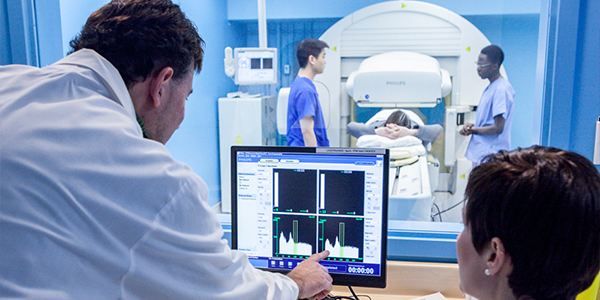Nuclear Medicine Technology
[one_half][ads1][/one_half]Nuclear Medicine Technology Courses deal with the technique of medical imaging. It is a branch of medicine that is used for diagnosis as well as treatment of diseases. The study is based on the properties of radioactive isotopes. Computers and other equipment’s are used in this study.This imaging process is applicable to anatomical as well as physiological aspects. Nuclear medicines, which includes molecular imaging, is the medical specialty that utilizes sealed and unsealed radioactive materials in the diagnosis and therapy of various diseases. This practice also includes the utilization of pharmaceuticals (used as adjunctive medications) and other imaging modalities with or without contrast to enhance the evaluation of physiologic processes at a molecular level.
Nuclear medicine technologists are allied health professionals who, under the direction of an authorized user, are committed to applying the art and skill of their profession to optimize diagnostic evaluation and therapy through the safe and effective use of radio-pharmaceuticals and adjunctive medications.
Skills Required :
A nuclear medicine technologist needs
- an interest in the science of medicine.
- a desire to help people.
- technical aptitude.
- analytical skills and the ability to interpret information.
- planning and organisational skills.
- the ability to undertake detailed and precise work.
Courses Offered :
The courses offered in this program are specially designed in order to meet the academic as well as clinical necessities and requirements for health professional education.
Core courses offered in the B.H.Sc Program include:
- Health Care Ethics.
- Anatomy & Physiology.
- Introduction to Health Professional Practice.
- Research Methods.
- Statistics.
- Leadership.
Subject / Syllabus :
Bachelor of Science in Nuclear Medicine Technology Syllabus
Main Subjects
- Human Anatomy & Physiology.
- Basics of Computer and Image hard copies production in NM, including X-ray Film/Image processing Techniques.
- Basic physics & Nuclear Physics.
- Physics of Nuclear Medicines Instrumentation.
- Radio-chemistry & Radio pharmacy.
- Nuclear Medicines Techniques & Special Procedures.
- Recent advances in Nuclear Medicines Techniques.
- Quality Assurances in Nuclear Medicine.
- Radiation Biology & Radiation safety in Nuclear Medicine.
Eligibility & Admission Process :
- A candidate who has passed 10+2 with minimum 45% marks in aggregate (40% in case of SC / ST candidate) or any other equivalent qualification.
- Some of the very reputed universities and institutes conduct entrance examination to get admission to the degree course.
Colleges :
- All India Institute of Medical Sciences (A.I.I.M.S).
- Manipal University, Manipal College of Allied Health Sciences.
- Tamil Nadu Dr. M.G.R. Medical University.
- Madras Medical Mission.
- Sanjay Gandhi Postgraduate Institute of Medical Sciences.
Job Prospects & Salaries :
A nuclear medicine technologist prepares and administers radio-pharmaceuticals, radioactive drugs, to a patient in order to treat or diagnose disease. He or she then uses a camera to create images that will track how the drug metabolizes in the patient’s body.





